一般现在时的被动语态2
- 格式:doc
- 大小:60.50 KB
- 文档页数:12
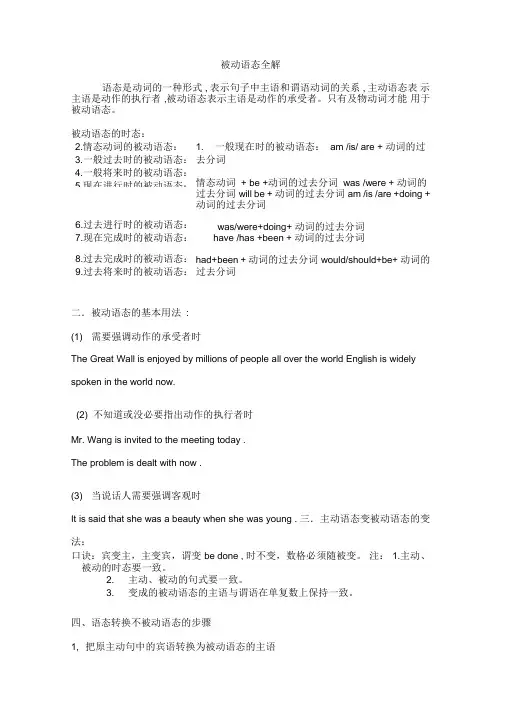
2.情态动词的被动语态:3.一般过去时的被动语态:4.一般将来时的被动语态:5.现在进行时的被动语态:6.过去进行时的被动语态:7.现在完成时的被动语态:8.过去完成时的被动语态:9.过去将来时的被动语态:被动语态全解语态是动词的一种形式, 表示句子中主语和谓语动词的关系, 主动语态表示主语是动作的执行者,被动语态表示主语是动作的承受者。
只有及物动词才能用于被动语态。
被动语态的时态:1. 一般现在时的被动语态:am /is/ are + 动词的过去分词情态动词+ be +动词的过去分词was /were + 动词的过去分词will be + 动词的过去分词am /is /are +doing +动词的过去分词was/were+doing+ 动词的过去分词have /has +been + 动词的过去分词had+been + 动词的过去分词would/should+be+ 动词的过去分词二.被动语态的基本用法:(1) 需要强调动作的承受者时The Great Wall is enjoyed by millions of people all over the world English is widely spoken in the world now.(2) 不知道或没必要指出动作的执行者时Mr. Wang is invited to the meeting today .The problem is dealt with now .(3) 当说话人需要强调客观时It is said that she was a beauty when she was young . 三.主动语态变被动语态的变法:口诀:宾变主,主变宾,谓变be done , 时不变,数格必须随被变。
注:1.主动、被动的时态要一致。
2. 主动、被动的句式要一致。
3. 变成的被动语态的主语与谓语在单复数上保持一致。
四、语态转换不被动语态的步骤1, 把原主动句中的宾语转换为被动语态的主语2, 把动词改为被动语态形式即"be+ 过去分词"。
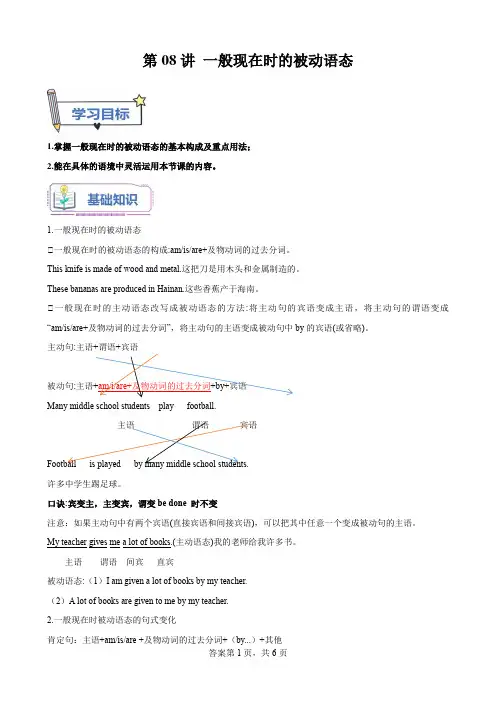
第08讲一般现在时的被动语态1.掌握一般现在时的被动语态的基本构成及重点用法;2.能在具体的语境中灵活运用本节课的内容。
1.一般现在时的被动语态①一般现在时的被动语态的构成:am/is/are+及物动词的过去分词。
This knife is made of wood and metal.这把刀是用木头和金属制造的。
These bananas are produced in Hainan.这些香蕉产于海南。
①一般现在时的主动语态改写成被动语态的方法:将主动句的宾语变成主语,将主动句的谓语变成“am/is/are+及物动词的过去分词”,将主动句的主语变成被动句中by的宾语(或省略)。
主动句:主语+谓语+宾语被动句:主语+am/i/are+及物动词的过去分词+by+宾语Many middle school students play football.主语谓语宾语Football is played by many middle school students.许多中学生踢足球。
口诀:宾变主,主变宾,谓变be done 时不变注意:如果主动句中有两个宾语(直接宾语和间接宾语),可以把其中任意一个变成被动句的主语。
My teacher gives me a lot of books.(主动语态)我的老师给我许多书。
主语谓语间宾直宾被动语态:(1)I am given a lot of books by my teacher.(2)A lot of books are given to me by my teacher.2.一般现在时被动语态的句式变化肯定句:主语+am/is/are +及物动词的过去分词+(by...)+其他Eg:The kite is made by Mary.这个风筝是玛丽做的。
否定句:主语+am/is/are +not+及物动词的过去分词+(by...)+其他Eg:The kite isn’t made by Mary.这个风筝不是玛丽做的。
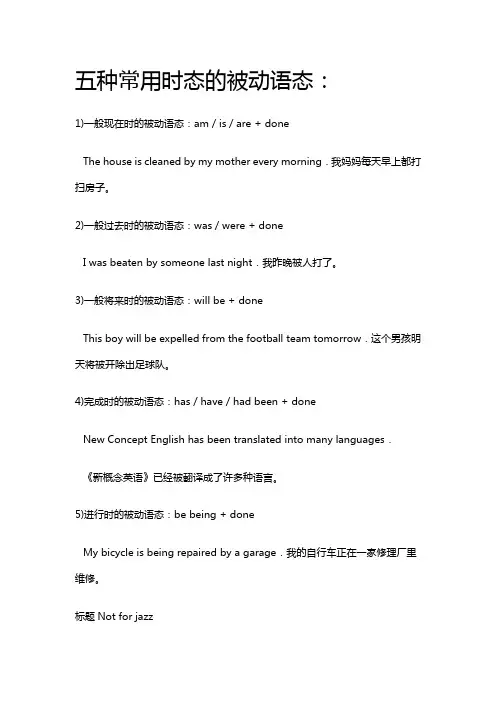
五种常用时态的被动语态:1)一般现在时的被动语态:am/is/are + doneThe house is cleaned by my mother every morning.我妈妈每天早上都打扫房子。
2)一般过去时的被动语态:was/were + doneI was beaten by someone last night.我昨晚被人打了。
3)一般将来时的被动语态:will be + doneThis boy will be expelled from the football team tomorrow.这个男孩明天将被开除出足球队。
4)完成时的被动语态:has/have/had been + doneNew Concept English has been translated into many languages.《新概念英语》已经被翻译成了许多种语言。
5)进行时的被动语态:be being + doneMy bicycle is being repaired by a garage.我的自行车正在一家修理厂里维修。
标题Not for jazz总结for的用法:1)为:I bought a book for you.我为你买了一本书。
2)因为:Something fell in,for I heard a splash.一定有东西掉下去了,因为我听见扑通一声。
4)适合:Not for jazz=It's not suitable to play jazz on the clavichord.古钢琴不适合演奏爵士乐。
Question:What happened to the clavichord?to后面加宾语,表示其身上发生了什么事,即动作的目标、对象。
What happened to you?你怎么了?(在你身上发生了什么事?)(1)否定句与疑问句的被动语态We don’t believe her.我们不信她的话。
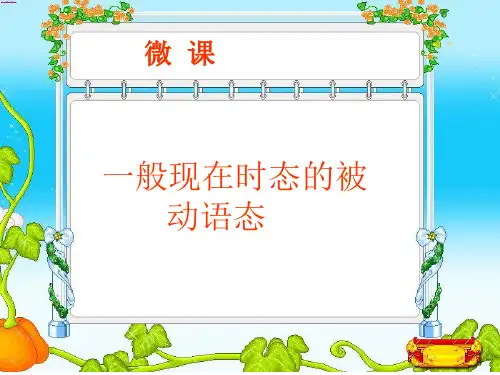
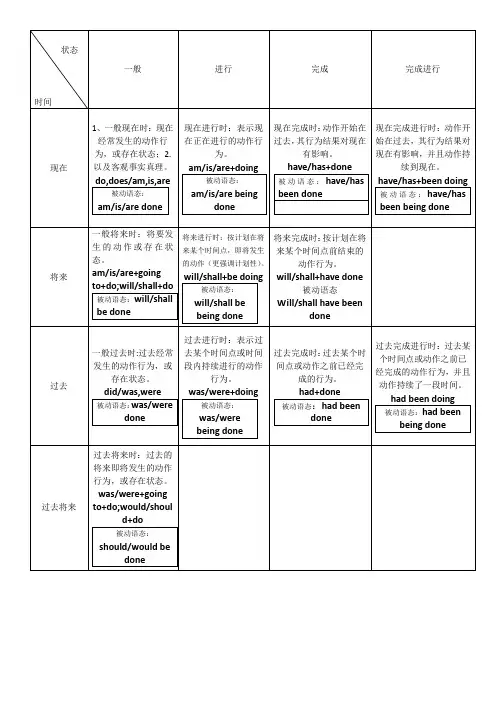
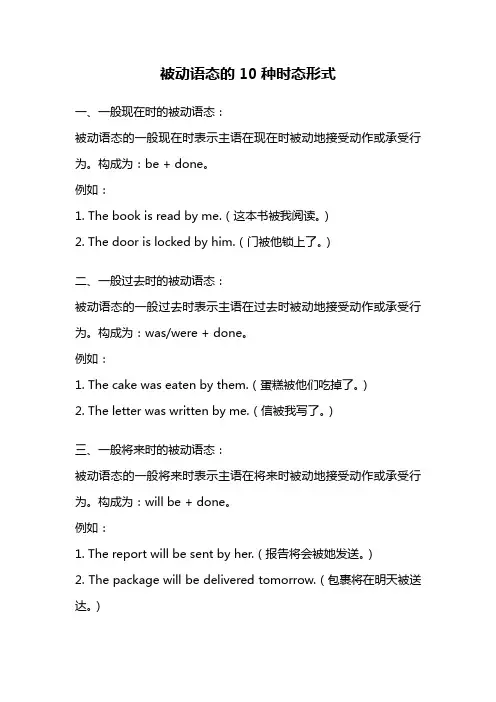
被动语态的10种时态形式一、一般现在时的被动语态:被动语态的一般现在时表示主语在现在时被动地接受动作或承受行为。
构成为:be + done。
例如:1. The book is read by me.(这本书被我阅读。
)2. The door is locked by him.(门被他锁上了。
)二、一般过去时的被动语态:被动语态的一般过去时表示主语在过去时被动地接受动作或承受行为。
构成为:was/were + done。
例如:1. The cake was eaten by them.(蛋糕被他们吃掉了。
)2. The letter was written by me.(信被我写了。
)三、一般将来时的被动语态:被动语态的一般将来时表示主语在将来时被动地接受动作或承受行为。
构成为:will be + done。
例如:1. The report will be sent by her.(报告将会被她发送。
)2. The package will be delivered tomorrow.(包裹将在明天被送达。
)四、现在进行时的被动语态:被动语态的现在进行时表示主语在现在进行时被动地接受动作或承受行为。
构成为:am/is/are being + done。
例如:1. The car is being washed by the workers.(汽车正在被工人清洗。
)2. The project is being discussed by the team.(项目正在被团队讨论。
)五、过去进行时的被动语态:被动语态的过去进行时表示主语在过去进行时被动地接受动作或承受行为。
构成为:was/were being + done。
例如:1. The house was being renovated last month.(房子上个月正在进行装修。
)2. The document was being translated by the intern.(文件正在被实习生翻译。
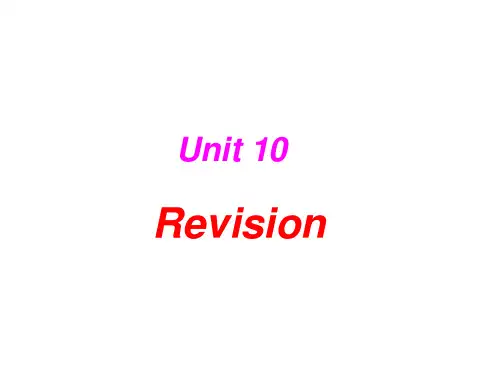
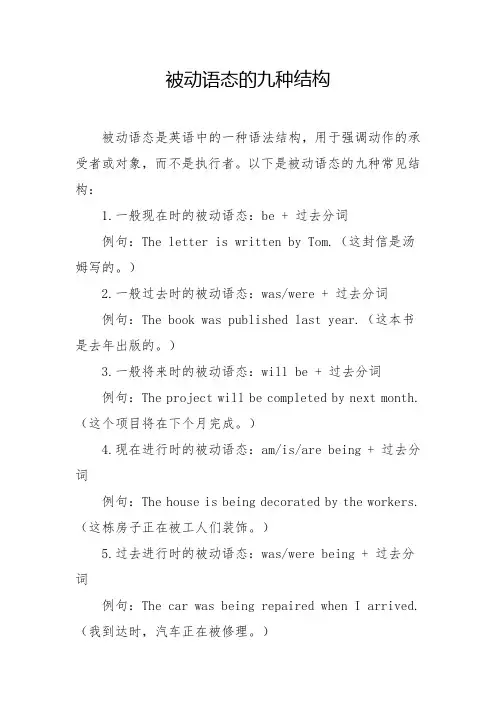
被动语态的九种结构被动语态是英语中的一种语法结构,用于强调动作的承受者或对象,而不是执行者。
以下是被动语态的九种常见结构:1.一般现在时的被动语态:be + 过去分词例句:The letter is written by Tom.(这封信是汤姆写的。
)2.一般过去时的被动语态:was/were + 过去分词例句:The book was published last year.(这本书是去年出版的。
)3.一般将来时的被动语态:will be + 过去分词例句:The project will be completed by next month.(这个项目将在下个月完成。
)4.现在进行时的被动语态:am/is/are being + 过去分词例句:The house is being decorated by the workers.(这栋房子正在被工人们装饰。
)5.过去进行时的被动语态:was/were being + 过去分词例句:The car was being repaired when I arrived.(我到达时,汽车正在被修理。
)6.现在完成时的被动语态:has/have been + 过去分词例句:The movie has been watched by millions of people.(这部电影已经被数百万人观看过。
)7.过去完成时的被动语态:had been + 过去分词例句:The assignment had been submitted before the deadline.(作业已在截止日期之前提交。
)8.情态动词的被动语态:情态动词 + be + 过去分词例句:The proposal should be considered carefully.(这个提案应该被认真考虑。
)9.进行时的情态动词被动语态:情态动词 + be + being + 过去分词例句:The problem must be being discussed by the team.(这个问题一定正在团队中被讨论。
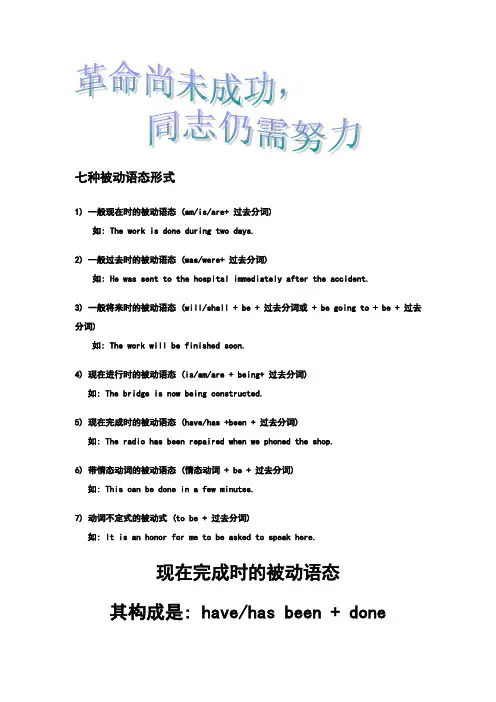
七种被动语态形式1) 一般现在时的被动语态 (am/is/are+ 过去分词)如: The work is done during two days.2) 一般过去时的被动语态 (was/were+ 过去分词)如: He was sent to the hospital immediately after the accident.3) 一般将来时的被动语态 (will/shall + be + 过去分词或 + be going to + be + 过去分词)如: The work will be finished soon.4) 现在进行时的被动语态 (is/am/are + being+ 过去分词)如: The bridge is now being constructed.5) 现在完成时的被动语态 (have/has +been + 过去分词)如: The radio has been repaired when we phoned the shop.6) 带情态动词的被动语态 (情态动词 + be + 过去分词)如: This can be done in a few minutes.7) 动词不定式的被动式 (to be + 过去分词)如: It is an honor for me to be asked to speak here.现在完成时的被动语态其构成是: have/has been + done现在完成时的被动语态表示动作发生在过去, 到现在已经完成或对现在仍有影响,。
如:1. The dirty clothes have been washed.脏衣服都已经洗了。
2. The plan has been studied by the experts for three times.这项计划已经由专家研究过三次了。
现在完成时:表示从过去持续到现在,还可能继续持续下去的动作,往往和表示一段时间的状语(for+一段时间, since…, )等连用,或用于how long 句型中1. 主语是行为动作的承受者。
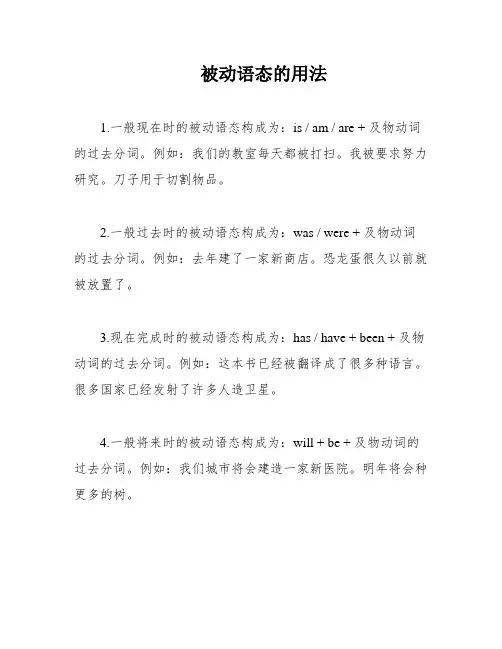
被动语态的用法1.一般现在时的被动语态构成为:is / am / are + 及物动词的过去分词。
例如:我们的教室每天都被打扫。
我被要求努力研究。
刀子用于切割物品。
2.一般过去时的被动语态构成为:was / were + 及物动词的过去分词。
例如:去年建了一家新商店。
恐龙蛋很久以前就被放置了。
3.现在完成时的被动语态构成为:has / have + been + 及物动词的过去分词。
例如:这本书已经被翻译成了很多种语言。
很多国家已经发射了许多人造卫星。
4.一般将来时的被动语态构成为:will + be + 及物动词的过去分词。
例如:我们城市将会建造一家新医院。
明年将会种更多的树。
5.含有情态动词的被动语态构成为:情态动词 + be + 及物动词的过去分词。
例如:年轻的树必须经常浇水。
你的错误应该立即纠正。
门可能被从里面锁上了。
你的作业可以明天交。
6.现在进行时的被动语态构成为:am / is / are + being + 及物动词的过去分词。
例如:___正在修理我的自行车。
现在我的自行车正在被___修理。
他们正在那里种树。
现在树正在被他们种植。
1.不及物动词没有被动语态。
What will happen in 100 years。
Dinosaurs disappeared about 65 n years ago.2.有些动词用主动形式表示被动意义。
___.3.感官动词或使役动词使用省略to的动词不定式。
在主动语态中不带to,但变为被动语态时,须加上to。
例如:make somebody do something → somebody + be + made to do something。
see somebody do somethi ng → somebody + be + seen to do something。
A girl saw my wallet drop when she passed by。
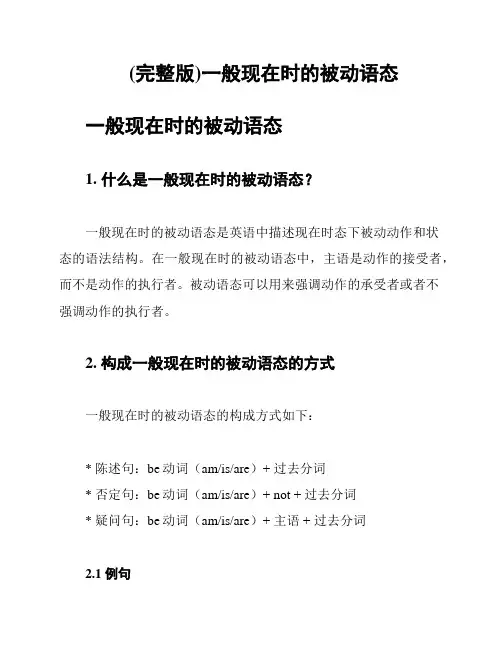
(完整版)一般现在时的被动语态一般现在时的被动语态1. 什么是一般现在时的被动语态?一般现在时的被动语态是英语中描述现在时态下被动动作和状态的语法结构。
在一般现在时的被动语态中,主语是动作的接受者,而不是动作的执行者。
被动语态可以用来强调动作的承受者或者不强调动作的执行者。
2. 构成一般现在时的被动语态的方式一般现在时的被动语态的构成方式如下:* 陈述句:be动词(am/is/are)+ 过去分词* 否定句:be动词(am/is/are)+ not + 过去分词* 疑问句:be动词(am/is/are)+ 主语 + 过去分词2.1 例句以下是一些例句,用于演示一般现在时的被动语态的构成方式:* The book is read by students.(被学生们阅读。
)* The food is cooked by the chef.(被厨师烹饪。
)* The report is written by Jane.(被简写的报道。
)2.2 第三人称单数的被动语态在一般现在时的被动语态中,如果主语是第三人称单数,则需要使用动词的第三人称单数形式,并加上be动词(is/are)。
例如:* The letter is sent by him.(被他寄出。
)* The car is driven by John.(被约翰开车。
)2.3 直陈疑问句和否定句的变化直陈疑问句和否定句在一般现在时的被动语态中的变化如下:* 直陈疑问句:把be动词(am/is/are)提前到句子开头。
* Are the books read by students?(书是被学生读的吗?)* Is the food cooked by the chef?(食物是被厨师烹饪的吗?)* 否定句:在be动词后加上not。
* The book is not read by students.(书不是被学生读的。
)* The food is not cooked by the chef.(食物不是被厨师烹饪的。
各种时态的被动语态一、八大时态的被动语态的构成:1.一般现在时的被动语态构成:(am/is/are +done)如:I am asked to study hard. 我被请求努力学习。
This shirt is washed once a week. 这件T恤一周洗一次。
These songs are usually sung by boys. 这些歌曲通常是男生唱的。
2.一般过去时的被动语态构成:(was/were done)如:The soldier was killed, but the train was saved. 这位战士牺牲了,然而列车得救了。
Some notes were passed up to the speaker. 有人给讲演者递上来一些纸条。
3.一般将来时的被动语态构成:(shall/will be done)如:We shall be asked a lot of strange questions. 我们将被问许多怪题。
My son will be sent to school next September. 来年九月我将送我儿子去读书。
4.过去将来时的被动语态构成:(should/would be done)如:The news would be sent to him as soon as it arrived. 消息一到就会转给他的。
He told us that the new railway would be built the next year. 他告诉我新铁路将在明年修建。
5.现在完成时的被动语态构成:(has/have been done)如:The work has just been finished. 工作刚刚结束。
The old rules have been done away with by us. 旧规章已经被我们废除了。
6.过去完成时的被动语态构成:(had been done)如:By last December three ships had been built by them. 到去年十二月底他们已建造了三艘船。
一般现在时的被动语态【概念】(1)一般现在时的被动语态:表示习惯性,经常性或者反复出现的被动动作.(2)被动语态:被动语态(passive voice)是动词的一种形式,用以说明主语与谓语动词之间的关系.英语的语态共有两种:主动语态和被动语态.主动语态表示主语是动作的执行者,被动语态表示主语是动作的承受者.被动语态是动词的一种特殊形式,一般来说,只有需要动作对象的及物动词才有被动语态.汉语往往用"被"、"受"、"给"等被动词来表示被动意义.被动语态由"助动词be+及物动词的过去分词"构成.(3)及物动词:在英语中按动词后可否直接跟宾语,可以把动词分成两种:及物动词与不及物动词.字典里词后标有vt.的就是及物动词,字典里词后标有vi.的就是不及物动词.不及物动词后不能直接跟有动作的对象(即宾语),若要跟宾语,必须先在其后添加上某个介词,如to,of,at后方可跟上宾语.及物动词可直接跟宾语.【结构】一般现在时的被动语态结构形式:主语+am/is/are+及物动词的过去分词.①助动词am/is/are+及物动词的过去分词+(by+宾语),其中by意为"被…;由…",表动作的执行者.如:The plants in his garden are watered by the gardener every day.花园里的植物每天被园丁浇水.②其肯定式、否定式、疑问式的变化规则与be作为连系动词时完全一样.如:The plants in his garden are watered by the gardener every day(肯定式).The plants in his garden are not watered by the gardener every day.(否定式)Are the plants in his garden watered by the gardener every day?(疑问式)Yes,they are./No,they aren't.【用法】(1)一般现在时态,在没有指明动作的执行者或者不知道动作执行者的情况下,可用被动。
动词的语态:主动语态和被动语态被动语态的基本结构:Be + done(过去分词)1、一般现在时:(主动语态)I help you.发出者动词承受者变为被动语态:Do——am/is/are doneYou are helped by me.承受者谓语发出者2、一般过去时的被动:did——was/were done(I helped you.-每个例子可让学生自己先尝试变被动,再给答案)3、一般将来时的被动:Will do——will be done(I will help you.-)4、现在进行时的被动:Am/is/are doing ——Am/is/are being done(I am helping you.-)5、过去进行时的被动:Was/were doing——Was/were being done(I was helping you.-)6、现在完成时的被动:Have done——have been done (I have helped you.-)7、过去完成时的被动:Had done——had been done (I had helped you.-)8、过去将来时的被动:Would do ——would be done (I would help you.-)答案:2、You were helped by me.3、You will be helped by me.4、You are being helped by me.5、You were being helped by me.6、You have been helped by me.7、You had been helped by me.8、You would be helped by me.。
被动语态被动语态的构成和用法被动语态是英语中常用的一种语态,它用来表达动作的接受者,而不是执行者。
被动语态的构成和用法在英语语法中占据重要的位置。
本文将详细介绍被动语态的构成和用法,帮助读者更好地理解和运用被动语态。
一、被动语态的构成:被动语态的构成由be动词和过去分词构成。
be动词根据主语的不同形式而变化,过去分词则保持不变。
具体构成如下:1. 一般现在时的被动语态由am/is/are + 过去分词构成:- 主动语态:主语 + am/is/are + 动词原形 + 宾语- 被动语态:主语 + am/is/are + 过去分词 + by + 动作执行者(可省略)2. 一般过去时的被动语态由was/were + 过去分词构成:- 主动语态:主语 + was/were + 动词原形 + 宾语- 被动语态:主语 + was/were + 过去分词 + by + 动作执行者(可省略)3. 一般将来时的被动语态由will be + 过去分词构成:- 主动语态:主语 + will be + 动词原形 + 宾语- 被动语态:主语 + will be + 过去分词 + by + 动作执行者(可省略)4. 现在进行时的被动语态由am/is/are being + 过去分词构成:- 主动语态:主语 + am/is/are + 动词ing形式 + 宾语- 被动语态:主语 + am/is/are being + 过去分词 + by + 动作执行者(可省略)5. 过去进行时的被动语态由was/were being + 过去分词构成:- 主动语态:主语 + was/were + 动词ing形式 + 宾语- 被动语态:主语 + was/were being + 过去分词 + by + 动作执行者(可省略)二、被动语态的用法:被动语态在英语中具有以下几个常见的用法:1. 强调动作的接受者:被动语态可以使得动作的接受者成为句子的主语,突出强调动作的接受者。
一般现在时的被动语态一、英语语态有主动语态和被动语态两种。
主语是动作的执行者,叫主动语态。
如: We clean the classroom. 我们打扫教室。
主语是动作的承受者,叫被动语态。
如:The classroom is cleaned (by us). 教室被(我们)打扫。
二、被动语态的构成:助动词be +及物动词的过去分词+(by+宾语)其中by意为“被……;由……”,表动作的执行者。
如:The glass is broken by that boy. 玻璃杯是那个男孩打破的。
肯定句:主语+ am / is / are + 动词的过去分词 +(by+人代宾格 )+ 其他eg .English is studied (by us ) every day.否定句: 主语+ am / is / are + not + 动词的过去分词 +(by+人代宾格 )+ 其他eg. English is not studied (by us ) every day.一般疑问句:Is English not studied (by us ) every day.?特殊疑问句:What/Where/When+ am / is / are +主语+动词的过去分词+ 其他三、被动语态的用法:下面的几种情况用被动语态1. 当我们不知道谁是动作的执行者时。
如: Silk is produced in Suzhou. 苏州出产丝绸。
2. 当没有必要说明谁是动作的执行者时。
如: Colour TV sets are sold in that shop. 那个商店出售彩电。
3. 强调说明动作的承受者时。
如:These bicycles are made in China. 这些自行车是中国制造的。
【温馨提示】如果需要说明动作的执行者时,由介词by引出。
如:This coat is made by her mother.这件大衣是她妈妈做的。
被动语态一般现在时的被动语态,其主要结构为:★主语动作接受者+ is / am / are + 动词的过去分词+ by+ 动作执行者Football is played in most countries in the world.被动语态的句型总结如下:肯定句:主语+ be + 过去分词+ by .The boy is called Jack.否定句:主语+ be not+ 过去分词+ by .The baby is not looked after by his father.一般疑问句:Be +主语+ 过去分词+ byIs King Lear written by Shakespeare特殊疑问句:特殊疑词+ be + 过去分词+ byWhat is this kind of sweater made of★被动语态的用法:1要表达“被…” 、“受…”、“让…”、“遭…”之类的语义.The teachers are well respected.The child is well loved by people.2强调动作承受者.He is known far and wide.他远近闻名.3不知道式没有必要指出动作的执行者.The room is cleaned every day.房子每天都有人打扫.4为礼貌起见避免提及动作执行者.I wonder if I was allowed to introduce myself我是否可以做自我介绍练习I.选择1. The streets ______ many times every day.A. cleanB. cleansC. cleanedD. are cleaned2. The music is very loud and it can ______ from a long way away.A. be heardB. is heardC. hearD. heard3. Mr. Smith has a loud voice. His voice can ______ clearly even in that big classroom.A. hearB. be heardC. be hearingD. have heard4. —Now computers ______ everywhere.—I agree with you. I think they are the most useful inventions in the world.A. are usingB. useC. are usedD. will use5.The whole China ______ to tears by Cairen Danzhou才仁旦舟, the youngest volunteer and hero in Yushu,Qinghai Province.A. moveB. movesC. is movingD. is moved6. It is true that knowledge ______ instead of being taught. A. learns B. learned C. is learned D. was learned7. These photos ______ on the Great Wall last week.A. were takenB. tookC. takeD. are taken8. —Can you read this letter for me —Sorry. It ______ in French. I can’t read it.A. writesB. wroteC. is writtenD. is writing9. Our school ______ 20 years ago. A. built B. builds C. is built D. was built10. A talk on the history of the Great Wall ______ in the school hall next week.A. givesB. gaveC. will be givenD. is givenII.用括号中所给动词的适当形式填空;1. Usually computers __________________use to get information on the Internet.2. I _________________ask to clean my bedroom every day by my mother.3. Trees ___________________ plant in spring.4. ---How clean and tidy your bedroom is---Thank you. It _________________clean every day.5. As China grows stronger and stronger , Chinese ________________teach in more and more schools out of our country.6. A book ___________________ give to me by my mother on my birthday.__________________say that Slumdog Millionaire贫民窟的百万富翁is a good film. 巩固练习一.把主动语态变成被动语态;cleans the room every Sunday. grow rice in the south .in England speak English play football on the playground every afternoon. you often watch TV at home in the evening doesn’t finish her homework don’t read that book.do they watch basketball match every week does Tom study do you listen to music二.把被动语态变成主动语态;are used for locking .weis played .the studentsare made of wood .workersisn’t had in the classroom.the teacherthis book read every dayare bikes made theyis done Lucythe pens made in the factoryyouisn’t spoken by people in China.are given some money they.。
一般现在时的被动语态:am/is/are done一般过去时的被动语态:was/were done现在完成时的被动语态:have /has been done过去完成时的被动语态:had been done现在进行时的被动语态:am/is/are being done过去进行时的被动语态:was / were being done一般将来时的被动语态:shall /will be done过去将来时的被动语态:should /would be done含情态动词的被动语态:情态动词+be done2)被动语态的否定式:在第一个助动词后加not构成。
3)被动语态的疑问式:把第一个助动词提到主语之前,句尾加问号构成。
例如:Where did they grow vegetables?(改为被动语态)Where _____ vegetables ______? (2002 福州) (答案: were, grown)一般现在时的被动语态:am/is/are done一般过去时的被动语态:was/were done现在完成时的被动语态:have /has been done过去完成时的被动语态:had been done现在进行时的被动语态:am/is/are being done过去进行时的被动语态:was / were being done一般将来时的被动语态:shall /will be done过去将来时的被动语态:should /would be done含情态动词的被动语态:情态动词+be done2)被动语态的否定式:在第一个助动词后加not构成。
3)被动语态的疑问式:把第一个助动词提到主语之前,句尾加问号构成。
例如:Where did they grow vegetables?(改为被动语态)Where _____ vegetables ______? (2002 福州) (答案: were, grown)中考英语定语从句复习在复合句中修饰名词和代词的从句叫做定语从句.被定语从句修饰的名词或代词叫做先行词.引导定语从句的关系代词有who, whose, whom, which, that, as ;引导定语从句的关系副词有when, where, why;关系代词在定语从句中做主语,宾语,定语.关系副词在定语从句中做状语.一.由who, 引导的定语从句,who在从句中做主语(口语中也可做宾语),修饰表示人的先行词. 例如:This is the man who helped me.Do you know the comrade who spoke just now ?The boy who//whom we saw yesterday is John’s brother.二.whom引导的定语从句,whom在从句中作宾语,修饰表示人的先行词,口语中可以省略.The doctor (whom) you are looking for is in the room.The person (whom) you just talked to is Mr. Li.=The person to whom you just talked is Mr. Li. (介词后whom不能省略)The babies whom the nurses are looking for are very healthy.(固定短语中的介词一般不省略,介词仍放在动词之后)三.whose引导的定语从句,whose在从句中作定语,修饰表示人或物的先行词. Do you know the woman whose name is Mary.Pass me the dictionary whose cover is black.四.that引导的定语从句,that在从句中做主语或宾语,修饰表示人或物的先行词, 作宾语时可省略,不能放在介词后面作宾语.The letter (that//which) I received was from my father.I can’t find the lett er that//which came this morning.Do you still remember the days (that//which)we spent together ?This is the man that//who helped me.The house (that//which) we live in is not large.=The house in which we live is not large.The doctor (that//whom //who)you are looking for is in the room.五. which引导的定语从句,which在从句中做主语,也可做宾语,或介词的宾语,修饰表示物的先行词. 先行词可以是词、短语、句子。
This is the book (which/that ) you want.The building which//that stands near the river is our school.The room in which there is a machine is a workshop.(介词后面的which不能省略) The house (which/that) we live in is not large.This is the watch (which/that ) he was looking for.(在含有介词的动词固定词组中,介词只能放在动词之后,不能放在which之前) 六、that 和which 都可以修饰表示物的先行词, 但是下列情况只能用that.①. 先行词为不定冠词all, few, little, much, everything, nothing 等.All (that) you have to do is to practise every day.There isn’t much (that) I can do.②. 先行词被序数词或形容词的最高级所修饰时.The first lesson (that) I learned will never be forgotten.This is the best film (that ) I have ever seen.③. 先行词被all, any, every, few, little, no, some 等不定代词修饰时.I have read all the books (that) you gave me.④. 先行词被the only, the very, the last, the same 等修饰时.The white flower is the only one that I really like.This is the very book that I want to read.This is the same book that I want to read. (同一本书)----This is the same book as I want to read.⑤. 当主句以who或which 开头的特殊疑问句时,定语从句that 引导.Who is the man that is standing there ?Which of us that knows something about physics doesn’t know this ?⑥先行词既有人又有物时。
We talked about the persons and things that we could remember.⑦time做先行词,前面如果有序数词或last 来修饰时,定语从句用that 来引导或省略;如果没有序数词或last 来修饰时,既可用when 也可用that来引导。
This is the last time ( that ) I shall give you a lesson.The first time ( that ) I saw him was in 1972.It’s time ( that ) we got up.七、as 引导的定语从句,as用作关系代词和关系副词引导限定性定语从句,在从句中作主语、定语、表语、或状语,常与the same … as; such… as , so… as , as… as 连用。
I like the same book as you do.I want to have such a dictionary as he has.I shall do it in the same way as you did.He is the same age as you ( are ).He will give you such information as will help you.Such students as you have mentioned should be criticized.=Students such as you have mentioned should be criticized.在the same…后也可用that引导定语从句,但意义有所不同:that 引出的定语从句,指的是与先行词同一事物;而as引出的定语从句是与先行词相似的同类事物。
I want to use the same tool that I used yesterday.I want to use the same tool as I used yesterday.八、由when 引导的定语从句,修饰表示时间的先行词,when为关系副词,做定语从句的时间状语。
I still remember the day when I first came to Beijing.I still remember the day on which I first came to Beijing.( 介词+which可以代替when)I’ll never forget the time when we worked on the farm.[I remember the days which//that we spent together.]九、由where 引导的定语从句,修饰表示地点的先行词,where为关系副词,做定语从句的地点状语。
This is the place where we lived for five years.The factory where his father works is in the west of the city.The factory in which his father works is in the west of the city.( 介词+which可以代替where)[ This is a place which//that I wanted to visit. ]十、Why引导的定语从句,why做原因状语。